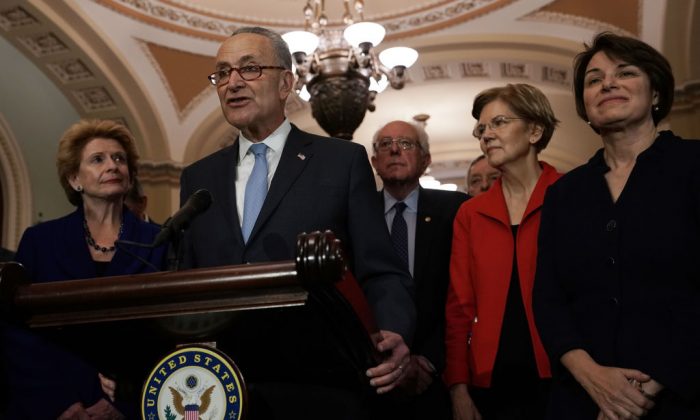Tying infrastructure bill to climate change will be ‘dead on
arrival,’ says expert.
President Donald Trump signaled that infrastructure could be
a key area of focus next year, which has been a priority for Democrats for
decades. Democratic congressional leaders, however, are coming up with
legislative demands that may impede Trump’s much-hoped-for infrastructure
reform.
In an op-ed for The Washington Post, Senate Minority Leader
Chuck Schumer (D-N.Y.) calls for “massive” spending on renewable energy, as a
condition for approving Trump’s infrastructure plan.
“If the president wanted to earn Democratic support in the
Senate, any infrastructure bill would have to include policies and funding that
help transition our country to a clean-energy economy and mitigate the risks
the United States already faces from climate change,” he wrote.
Schumer also lists the types of policies Democrats expect to
see in an infrastructure bill. He calls for “massive investments” in climate
resiliency and renewable energy, especially in technologies such as battery
storage.
“We should provide permanent tax credits for clean-energy
production and storage, electric vehicles, and energy-efficient homes,” he
continues.
He also pushes for measures to “reduce the release of
methane pollution from domestic energy production” and cut “the amount of
carbon we release into the atmosphere.”
These requests mean imposing considerable costs on
American taxpayers, according to Nicolas Loris, an economist and
environmental policy expert at The Heritage Foundation.
“Introducing climate into an infrastructure package only
creates more division among members of Congress,” he said. “It’s been pretty
clear that ever since cap-and-trade legislation failed there’s been no real
appetite to move any big climate bill because of the cost and the negligible
climate benefit that you would get from it.”
‘Dead on Arrival’
In June 2009, the U.S. House of Representatives passed the
American Clean Energy and Security Act of 2009. The legislation aimed to
establish an economy-wide greenhouse gas cap-and-trade system under which the
government would set a limit on total emissions. Companies would then buy or
sell permits to emit these gases. The measure, however, died, as it never
reached the Senate floor for discussion or a vote.
According to Loris, if Democratic demands are introduced
into an infrastructure package, it will be “dead on arrival.”
That’s “the opposite direction of which this administration
and a lot of members of Congress want to go, especially given in light of what
you’ve seen in France over the past few weeks and revolts against these energy
taxes,” he said.
Democrats will control the House of
Representatives in the 116th Congress. But Senate Democrats will have
substantial leverage as well, says Schumer in his op-ed.
The Senate needs to garner 60 votes for an
infrastructure bill.
Schumer claims that his proposed plan can be fully financed
by reversing some of the corporate and individual tax cuts passed last year.
Trump has been calling for an infrastructure overhaul since
the start of his presidency. He has called on Congress last year to produce a
bill that generates at least $1.5 trillion for the new infrastructure
investment to fix the nation’s roads, bridges, airports, railways, and
ports.
He also signed an executive
order to speed up the environmental review and permitting process for
infrastructure investments. The order aims to fix the fragmented approval
system and shorten the time for processing approval documents for
infrastructure projects. Congress now has to codify these changes into law.
The American Society of Civil Engineers gave a
near-failing D-plus grade to U.S. infrastructure last year. And the
grade extends across every state and every asset class in infrastructure.
On Dec. 10, Trump is set to meet with Schumer and House
Minority Leader Nancy Pelosi (D-Calif.) to discuss a budget deal and funding of
a border wall. Infrastructure reform may also be brought to the table during
the meeting.
“The real issues should be fiscal responsibility and long
lasting regulatory reforms that allow for infrastructure to actually be built
in a reasonable timeframe,” Loris said, adding that there’s still a hope of
getting bipartisan support to fix the nation’s broken permitting process. The
regulatory hurdles affect all infrastructure investments including renewable
energy projects.
A lot of the renewable energy projects in the country “have
been stalled in regulatory red tape,” he said.
“There’s a lot of room to get some of those long-lasting
regulatory reforms that the country desperately needs to encourage more
investment and innovation in infrastructure.”


No comments:
Post a Comment